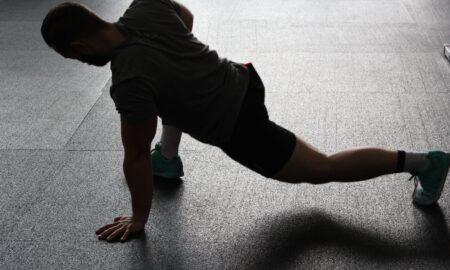Studies show that engaging in resistance exercise, such as typical bodybuilding workouts, stimulates muscle protein synthesis for up to 48 hours following the training session. That is, in fact, one reason it would be foolish to train the same muscle group within a 48-hour time span: The muscle hasn’t fully recovered from the last session, and protein synthesis, which is responsible for added muscle mass and strength, isn’t yet complete. Exercise also promotes muscle catabolism, or breakdown, especially when you’re not getting enough protein.
Carbohydrates inhibit the exercise-induced muscle breakdown after exercise by suppressing the effects of cortisol, the major catabolic hormone in the body, which rises during training. Carbs are also the key nutrient that replenishes depleted stores of muscle glycogen, the primary fuel of anaerobic exercise such as weight training. On the other hand, carbs are not directly involved in muscle protein synthesis after training.
Many studies show that the optimal nutrient combination for spurring muscle protein synthesis with exercise is protein and carbohydrates. Having a protein-and-carb drink before and/or after training aids muscle protein synthesis and inhibits muscle breakdown. That has to do with heightened hormone stimulation induced by the nutrient combination. Specifically, taking in protein and carb helps release more insulin while blunting cortisol. Insulin inhibits muscle protein breakdown and, helped by a high concentration of amino acids, leads to muscle protein synthesis.
One possible flaw in studies that have examined the anabolic effects of a protein-and-carb drink is that the subjects hadn’t eaten food in many hours. Most bodybuilders who use protein-and-carb drinks have already eaten several meals, especially if you have the drinks later in the day or in the evening. That raises the question of whether having amino acids in the blood from previous meals blunts the anabolic effects of protein-and-carb drinks. Another question is, If you drink the combo beverage at night, will the anabolic effects last throughout the night?
Those issues were examined in a recent study.1 Subjects were randomly assigned to either a protein-and-carb group or a flavored-water group. They engaged in a two-hour full-body weight-training session. They drank either the placebo or the protein-and-carb combo during the session plus had two more drinks, one at 30 minutes and one at 90 minutes after training. They trained in the evening and remained overnight in the lab, where researchers measured their rates of whole-body and muscle protein synthesis through tagged amino acids. The subjects also provided muscle biopsies from their legs before and immediately after training, as well as nine hours later.
During training, the subjects drank 1.5 milliliters for every kilogram of bodyweight of the protein-and-carb formula every 15 minutes. The drinks they got at the 30- and 90-minute marks after the workout contained four milliliters per kilogram of bodyweight. The drinks provided carbs at a rate of 0.15 grams per kilogram of bodyweight, along with the same amount of protein hydrolysate, which in this case was enzymatically digested casein, a primary milk protein.
Though the subjects had eaten throughout the day, the protein-and-carb drink elevated muscle protein synthesis during exercise by 48 percent—but, while it boosted whole-body protein synthesis 19 percent in the nine hours following exercise, it didn’t boost muscle protein synthesis. It was previously thought that little or no muscle protein synthesis occurred during the actual training session, but this and other recent studies show otherwise. It may be due to the intermittent nature of weight training, given the rest periods between sets. Even the brief periods of rest apparently enable muscle protein synthesis to occur during training, especially when protein and carbs are also concentrated in the blood. The increased blood circulation that occurs with training makes for more rapid entry of nutrients into muscle. The protein-and-carb drink boosted whole-body protein synthesis by 40 percent during the first three hours after training. Those who drank water alone didn’t experience that.
Interestingly, the muscle-protein-synthesis rates didn’t differ between the groups. Note that whole-body protein synthesis differs from muscle protein synthesis in that whole-body protein synthesis reflects what occurs in tissues other than muscle, such as gut and brain proteins
.
As to why the rates didn’t increase during the nine hours after exercise, the authors offer several possible explanations. Perhaps the protein-and-carb drink failed to elevate blood amino acids and insulin throughout the night. Maximizing muscle protein synthesis requires a high concentration of both amino acids and insulin in the blood, which doesn’t usually happen during the night. Some have suggested getting up to eat during the night. That might improve muscle protein synthesis rates, but the lack of sleep would offset any benefits. The authors mention an equally dubious technique: an intravenous infusion of amino acids while you sleep.
A more practical method would be to take a slow-release protein before bed to give you a steady trickle of aminos into the blood. Since certain amino acids also bring on insulin release, that would also take care of the insulin requirement. The protein used in this study was a rapidly absorbed casein. Yet the usual form of casein is ideal for overnight use. It’s a slow-acting protein that lasts up to seven hours in the blood, which of course fills the bill nicely for overnight anabolic muscle protein purposes.
1Beelen, M., et al. (2008). Coingestion of carbohydrate and protein hydrolysate stimulates muscle protein synthesis during exercise in young men, with no further increase during subsequent overnight recovery. J Nutr. 138:2198-2204.




















You must be logged in to post a comment Login